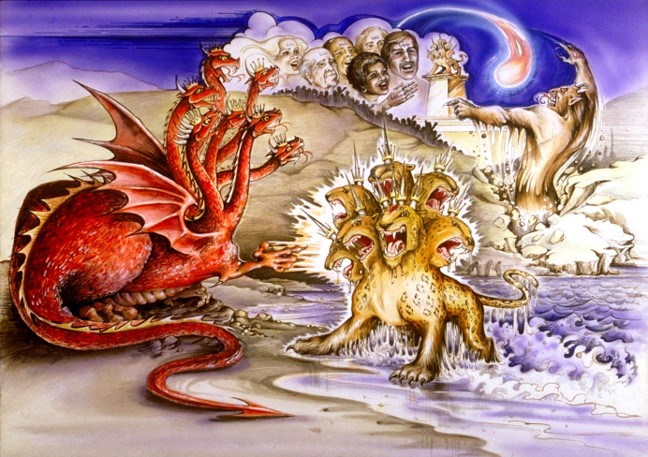Revelation as a pastoral letter
- a fresh look at the book of Revelation

What's this site about?
This site allows you to take a look at an attempt to unravel the meaning of the last message of the Lord Jesus Christ to believers - the book of Revelation. This analysis began life as a series of four lectures given at a Conference in 2002. Those lectures were never intended to be comprehensive, so that the Covid19 ‘lock-down’ in March 2019, seemed to offer a unique opportunity to set down on paper the Biblical basis for regarding the book of Revelation as a pastoral epistle, and to determine whether the great amount of detail the prophecy contains would make sense in such a context.
The approach
There are four recognised schemes of interpretation of Revelation: the Historic, in which the prophecy is thought to portray the continuous flow of western history from the time of John to the future return of Christ; the Futurist, in which the prophecy is seen as being concerned with ‘end-time’ events associated with the second coming of Christ; the Preterist, which focuses on events in early Christian history up to the destruction of the Jewish Temple in AD 70; and the Idealistic, which regards the prophecy as a kind of extended allegory reflecting the struggle between good and evil in the world. The present interpretation does not follow any of these schemes. It is simply an attempt to reconstruct an interpretation of the prophecy which members of the first century churches could have devised, having only their scriptures and their knowledge of local historic events.
This review of Revelation is not a verse by verse commentary, neither is it an academic thesis with footnotes and references. It is an accumulation of ideas assembled over a long period of time which draws on the writings of many commentators to whom the author is heavily indebted. Some of the key ones are listed below.

Artwork by Pat Marvenko Smith ©1982/1992 - www.revelationillustrated.com
used by permission
For reasons of space, the full text of Revelation has not been included. However, with the exception of the opening section which is largely introductory, each subsequent chapter has been headed with a summary of the visions to be considered in that chapter. It is hoped that this will provide some continuity and will provide the reader with a preview of the topics to be covered in each chapter.
The author
As author, I can claim no special qualifications for this task. Although I have been interested in Biblical theology virtually from hearing Bible stories in Sunday School, I have never been professionally or academically trained in this field. In fact, professionally speaking I am a physicist. I have spent my professional life doing applied research on the topic of road safety, and in this area I have authored over 50 scientific publications of various sorts. I regard the Bible as the inspired word of God, and Revelation as a message from Jesus Christ; as such I would expect to be able to apply rational analysis to its message as though one were testing a scientific theory against experimental data.
I have not added my name to the text of the annexed commentary, since what matters is not who wrote it, but the power and authority of the message itself. This must be judged by the reader.
Thank-yous
Over the years I have taken an interest in the wide range of interpretations of Revelation offered by various authors. Although I would find it very difficult to identify from these authors the source of any specific aspect of the interpretation contained in this commentary, I am without doubt indebted to many expositors for insights into both the practical meaning of and the spiritual significance of what John wrote. I have found the following to be both inspiring and helpful:
| Barclay, William, 1976 | The Revelation of John, Westminster Press, Philadelphia. |
| Bauckham, Richard, 1993 | The Climax of Prophecy. T&T Clark Ltd. Edinburgh. |
| Bauckham, Richard, 1993 | The theology of the book of Revelation. Cambridge University Press. |
| Beckwith, Isbon T., 2001 | The Apocalypse of John. Wipf and Stock Publishers, Eugene, OR. |
| Caird, G. B., 1966 | The Revelation of St. John the Divine. Harper and Row, New York. |
| Hendriksen, William, 1940 | More than Conquerors – an interpretation of the book of Revelation. Baker Books, Grand Rapids, MI. |
| Ladd, George Eldon, 1972 | A commentary on the Revelation of John. Eerdman’s Publishing Company, Grand Rapids, MI. |
| Lunn, N., 1992 | Alpha and Omega. A commentary on the book of Revelation. |
| Maxwell, Marcus, 1997 | Revelation. The Bible reading fellowship, Oxford. |
| Morris, Leon, 1969 | Revelation. The Tyndale Press, Leicester. |
| Mounce, Robert H., 1977 | The book of Revelation. Eerdman’s Publishing Company, Grand Rapids, MI. |
| Mounce, Robert H. | Revelation in the New International Commentary on the New Testament. Eerdman’s Publishing Company, Grand Rapids, MI. |
| Michaels, Ramsey J., 1997 | Revelation. Inter-Varsity Press, Leicester. |
| Norris, A. D., 1982 | Apocalypse for Everyman. |
| Whittaker, H. A. 1973 | Revelation, a Biblical approach. |
| Wilcock, Michael, 1975 | I saw heaven opened – the message of Revelation. Inter-Varsity Press, Leicester. |
Can you believe it?
Although I am extremely grateful for the contributions of the above authors, I cannot claim that my interpretation of the message of Revelation is in any way supported or validated by any of them. I am only too aware that the interpretation of a message to the churches from the risen Lord, is not something to be attempted lightly. I have prayed continuously through the writing of this commentary, and those who read it should read it both prayerfully and critically, searching the scriptures to see if what is being suggested makes sense in terms of the greater purpose of God in Christ revealed in the whole of scripture. This interpretation of Revelation has not been reviewed extensively by my fellow Bible students, but I am grateful to those who have read parts or all of it, (especially Andrew) for their comments which have resulted in significant clarifications to the text.
I am also grateful to my grandson Steve for setting up this website, so that those interested may at least consider this largely non-historical view of Revelation.